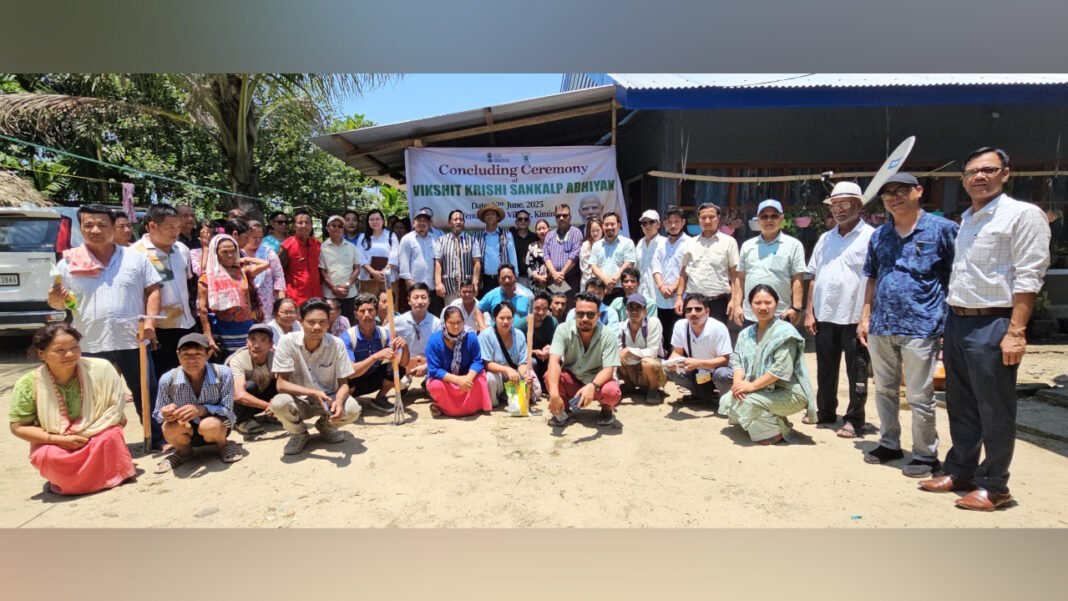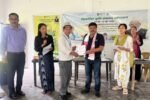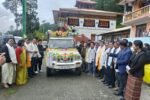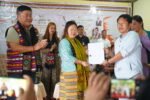HT Bureau
NAMSAI, June 13: The Viksit Krishi Sankalp Abhiyan (VKSA), a first-of-its-kind, farmer-centric initiative spearheaded by the Government of India, concluded its extensive campaign across Arunachal Pradesh on June 12, after a vibrant and impactful fortnight-long outreach from May 29. The campaign, aimed at transforming agriculture through technological dissemination and grassroots participation, touched the remotest corners of the state—including high-altitude frontier villages—setting a remarkable benchmark in inclusive agricultural development.
The campaign was launched at the national level by the Union Minister of Agriculture and Farmers Welfare & Rural Development, Shivraj Singh Chouhan, and was coordinated in Arunachal Pradesh by the ICAR-Agricultural Technology Application Research Institute (ATARI), Zone VI, Guwahati. Key implementing partners included the line departments of the Government of Arunachal Pradesh, ICAR institutes, and the Colleges of the Central Agricultural University, Imphal. Playing a pivotal role in on-ground execution, all 17 Krishi Vigyan Kendras (KVKs) across the state actively participated and ensured the campaign’s reach into every district.
In a state where difficult terrain and sparse connectivity often challenge service delivery, the VKSA remarkably managed to connect with over 1.24 lakh farmers—comprising 54,421 males and 69,881 females—across approximately 2,291 villages. The near-equal gender representation further underlined the inclusivity of the campaign. Anchored around climate-resilient, region-specific, and organic farming solutions, the initiative promoted sustainable practices suited to Arunachal Pradesh’s diverse agro-climatic zones and ecologically sensitive environment.
A key highlight of the campaign was the symbolic and strategic launch of the VKSA Krishi Rath, carried out in partnership with Indian Army personnel from frontier villages such as Zemithang, Kaho, Kibithoo, Taksing, Lapra, and Aropo. These villages, located along the international borders with China, served as the starting points for the Krishi Rath’s journey—carrying essential information, best practices, and agricultural technologies to farmers in the remotest locations. The Rath’s outreach not only brought agricultural extension services closer to people but also strengthened national visibility and integration of the border regions.
Throughout the campaign duration, 34 multidisciplinary field teams comprising scientists and departmental officials undertook an impressive total of 845 events across the state. These included a range of dynamic activities such as demonstrations on improved cultivation techniques, farmer-scientist dialogues, and participatory data collection exercises. Notable among these was the Seed Exchange Program, during which around 40 farmers participated in exchanging over 20 indigenous and improved varieties of rice, pulses, vegetables, and horticultural crops—preserving biodiversity while promoting farmer-to-farmer knowledge sharing. Additionally, Animal Health Camps and distribution of critical agricultural inputs were conducted to support both crop and livestock productivity.
The VKSA’s approach was not limited to top-down knowledge dissemination. It actively encouraged two-way learning—empowering farmers with hands-on training while also enabling scientists to gather on-ground insights, traditional practices, and feedback that will help shape future agricultural strategies tailored to local contexts.
Reflecting on the initiative, Dr G Kadirvel, Director of ICAR ATARI Zone VI, said, “This is not just a campaign—it’s a step toward agricultural self-reliance. When frontier villages like Kibithoo and Taksing host seed exchanges and Krishi Rath campaigns, it signals not only inclusion but a bold march toward Atmanirbhar Krishi. Arunachal Pradesh has shown that geographical remoteness is no barrier to innovation and enthusiasm.”
The VKSA’s culmination in the state marks a dynamic synergy between scientific innovation, public policy, and indigenous agricultural knowledge. The campaign’s resounding success reaffirms the strength of the “One Nation, One Agriculture, One Team” approach, reflecting the central government’s vision for an empowered, self-sustaining agricultural sector.
Meanwhile, the VKSA—launched nationwide from Itanagar on May 29—concluded today with successful state-level events across Arunachal Pradesh. The 12-day campaign focused on raising awareness about improved kharif crop technologies, promoting natural farming practices, guiding scientific crop selection based on soil health data, and encouraging balanced fertilizer usage. It also aimed to bridge the gap between government schemes and farmers, ensuring better implementation and understanding of both central and state programs.
Particularly notable was the distribution of Soil Health Cards and maize seeds to farmers, an initiative that drew significant appreciation from participants and stakeholders alike. In Arunachal Pradesh’s Papum Pare district, the VKSA was carried out across all six blocks, covering 220 villages and directly benefiting 7,748 farmers. The initiative was led by the Subject Matter Specialists of Krishi Vigyan Kendra, Papum Pare, supported by district-level teams from the Departments of Agriculture, Horticulture, and Veterinary Sciences, Central Agricultural University, Pasighat, and Arunachal State Rural Livelihoods Mission (ArRSLM).
The concluding ceremonies were held at Dirga village in Kakoi Circle and Hawa Camp in Kimin Circle. The events witnessed the presence of key dignitaries including State President of BJKM Arunachal Pradesh, Shri Gumsen Lollen; Director of Agriculture, T.D. Neckom; Director of Horticulture, Karyom Doji; Assistant Agricultural Marketing Adviser (In-Charge Northeast) from the Ministry of Agriculture & Farmers Welfare, Shri Tapash Bhattacharjee; Jt. Director (PP) cum Nodal Officer VKSA, Shri Mark Boje; DAO Maze Piel; DHO Joram Bath; DVO Dr. Takio Taram; Senior Scientist & Head of KVK, Dr. Bangkeng Perme, as well as local panchayat leaders, officials, and farmers.
The collective participation and cross-sectoral collaboration throughout the campaign underscore Arunachal Pradesh’s commitment to inclusive agricultural development and serve as a replicable model for similar initiatives in challenging terrains.












